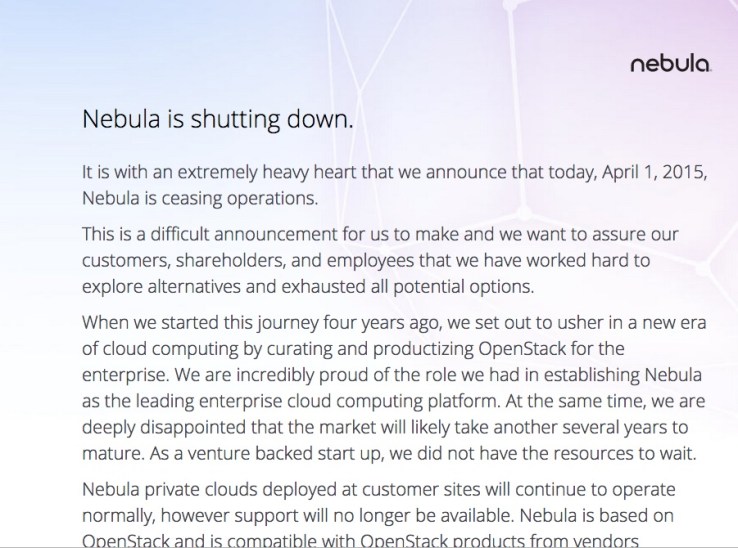 Nebula, makers
of an OpenStack appliance designed to simplify the complexities of
installing an OpenStack instance, shut its doors yesterday.
Nebula, makers
of an OpenStack appliance designed to simplify the complexities of
installing an OpenStack instance, shut its doors yesterday.The company announced it was shutting down with a statement that appears on its website with a date of April 1, 2015. It does not appear that this is a prank.
It is with an extremely heavy heart that we announce that today, April 1, 2015, Nebula is ceasing operations.The company had tons of promise, raising $38.5M in venture funds with the most recent funding being 3.5 Million debt financing on April 13, 2014. The company was co-founded by ex-NASA CTO Chris Kemp, who left the company in 2013, and now sits on the OpenStack Foundation board of directors.
This is a difficult announcement for us to make and we want to assure our customers, shareholders, and employees that we have worked hard to explore alternatives and exhausted all potential options.
Ken Rugg, CEO at Tesora, a database used in the OpenStack ecosystem says this announcement is part of the ongoing trend towards consolidation in OpenStack.
“Metacloud and CloudScaling were both already acquired. The big fish have entered the pond making it harder for the remaining smaller “OpenStack generalists” to compete. Red Hat, HP, IBM, Oracle EMC and VMware are all investing huge dollars into their distributions so it’s hard to see how a company like Nebula can compete,” Rugg explained.
“I believe that delivering a software solution as an appliance works better once a market is more mature and there is already a large demand for the software and people using it. I think it tends to be a better sale to late majority who don’t have the technology chops to set things up themselves and want a “plug and play” approach. When Netezza came out, people already knew that they needed a data warehouse and were looking to get a top of the line one in an easily consumable form factor. OpenStack is still in the early adopter phase,” he explained.
Mirantis CMO and co-founder Boris Renski called Nebula’s demise unfortunate because it contributed a great deal to OpenStack, but also saw it as part of OpenStack’s natural evolution where some succeed and some don’t.
“Ultimately, however, this is a natural and unavoidable process of market maturation. OpenStack is graduating from being a cool thing for hackers to a real and mature market and as a byproduct, some of the earlier players won’t make it,” Renski said.
Perhaps Nebula paid a price for getting to the market too early. Regardless of the reason, another one bites the dust and it could be a sign for other small players that they need to figure out how to survive in a shifting marketplace.
Disclosure: I used to be a paid blogger for Tesora.